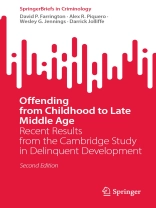This second edition book advances knowledge about criminal careers throughout life. It presents new results from the Cambridge Study in Delinquent Development (CSDD), which is a unique longitudinal study of the development of offending from age 10 to age 61. Previous results obtained in the CSDD are reviewed, and then new findings from official criminal records up to age 61 are presented: on offending at different ages, continuity in offending, ages of onset, and criminal career duration. The number of offenders and offenses between ages 50 and 61 is noteworthy. The book then presents results on self-reported offending in different age ranges up to 48: on prevalence, frequency, continuity, and comparisons with official records that suggest that official records only capture the tip of the iceberg of offending. It then analyzes different trajectories of official offending up to age 61 and shows to what extent they could be predicted by childhood risk factors. New results from the CSDD in the last 10 years are then presented, followed by a discussion of the relevance of all the findings for criminological theories and public policies such as early intervention. This book should be of great interest not only to academics but also to policy makers and practitioners who are concerned with crime.
.
.
.
.
.
.
.
.
.
.
.
.
.
.
.
.
विषयसूची
Chapter 1 . Introduction to Criminal Careers.-
Chapter 2 . The CSDD: Previous Results.-
Chapter 3 . Official Criminal Careers.-
Chapter 4 . Self-Reported Versus Official Offending.-
Chapter 5 . Trajectories of Offending to Age 61.-
Chapter 6 . What have we learned from the CSDD in the last ten years?.-
Chapter 7 . Conclusions.-
Chapter 8 . 2013-2023 Publications presenting results from the CSDD (120).
लेखक के बारे में
David P. Farrington, O.B.E., is Emeritus Professor of Psychological Criminology at the Institute of Criminology, Cambridge University. He has received the Stockholm Prize in Criminology and the four major awards (Sellin-Glueck, Sutherland, Vollmer, Bloch) of the American Society of Criminology. He is a Fellow of the British Academy, of the Academy of Medical Sciences, of the British Psychological Society, and of the American Society of Criminology.
Alex R. Piquero is Professor of Sociology and Criminology and Arts and Sciences Distinguished Scholar at the University of Miami. He is currently serving as Director of the Bureau of Justice Statistics (effective August 2022). He has received several research, teaching, and service awards and is Fellow of both the American Society of Criminology and the Academy of Criminal Justice Sciences.
Wesley G. Jennings is Gillespie Distinguished Scholar, Chair, Professor, and Director of the Center for Evidence-Based Policing and Reform (CEBPR) in the Department of Criminal Justice and Legal Studies in the School of Applied Sciences and a Faculty Affiliate at the School of Law at the University of Mississippi. He is a member of the American Bar Association, the American Society of Criminology, and a Lifetime Member of both the Academy of Criminal Justice Sciences and the Southern Criminal Justice Association.
Darrick Jolliffe is Professor of Criminology and former Head of the School of Law and Criminology, University of Greenwich. He is Co-Editor-in Chief of the Journal of Developmental and Life-Course Criminology and on the Editorial Board of the British Journal of Criminology and Victims and Offenders. He was an academic appointee to the Expert Panel of the Youth Endowment Fund.












